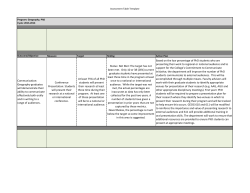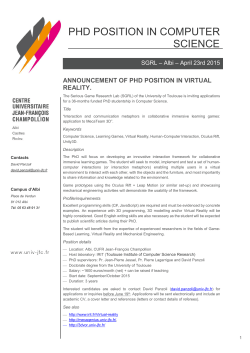
PhD position at BOREA
PhD position at BOREA The research Unit BOREA offers a 3-‐year PhD position in fish and evolutionary endocrinology. The position is part of an EU Innovative Training Network (ITN) project “IMPRESS”. PhD project title: Characterization of novel brain neuropeptides and their receptors in eel and potential applications in fish breeding programs The selected candidate is expected to start on October 1, 2015, and will be registered at the PhD School of the National Museum of Natural History (MNHN), Paris, France. The position is funded by a new EU Horizon 2020 Marie Sklodowska-‐Curie Innovative Training Network (ITN) on ¨Improved production strategies for endangered freshwater species¨ (IMPRESS). IMPRESS is a nine partner project starting in January 2015, and co-‐ ordinated by the Norwegian University of Life Sciences (NMBU), Oslo, Norway. IMPRESS offers a highly interdisciplinary and international training for 15 PhD students throughout the EU (see www.impress-‐itn.eu for a description of all 15 PhD projects), with a highly competitive salary and close contacts with industry, government agencies and leading laboratories. In addition to conducting research, students will be enrolled on an extensive programme of short training courses, and secondments at other partner institutions. IMPRESS aims to develop new technologies and approaches for improved production, management and conservation of three threatened diadromous fish species, the European eel, Atlantic salmon and the sturgeons. IMPRESS is an intersectoral training network covering a range of multidisciplinary aspects including molecular biology, physiology, and aquaculture production, as well as human dimensions of conservation management. Host Institute: Research Unit BOREA (Biology of Aquatic Organisms and Ecosystems), MNHN, Paris, France (http://www.borea.mnhn.fr) Supervisor and contact person: Sylvie Dufour (sylvie.dufour@mnhn.fr) Co-supervisors: Nédia Kamech (nedia.kamech@upmc.fr) and Karine Rousseau (karine.rousseau@mnhn.fr) The PhD student will be member of Team 2 “Reproduction and Development of Aquatic Organisms: evolution, adaptation, regulations” of BOREA. He/she will work in close interaction with the other members of the team. Project description: Objectives: The European eel, Anguilla anguilla, is an endangered species, of biological, phylogenetical, ecological, and socio-‐economical relevance. The life-‐cycle of the European eel has yet to be successfully closed in captivity. One of the major bottlenecks concerns the blockade of puberty. Gaining new basic knowledge on eel reproductive endocrinology is crucial for future development of eel conservation. This PhD project will aim to investigate neuropeptides and receptors in the eel, with a special focus on conserved duplicated genes. Brain neuropeptides comprise a diverse group of small signalling molecules that control major biological processes such as feeding, growth, metabolism, reproduction, stress or immune response. They act through binding to neuropeptide receptors, which mainly belong to the G protein-‐coupled receptor (GPCR) family, one of the largest categories of proteins encoded by animal genomes. The eel shows a remarkable conservation of duplicated genes resulting from the teleost-‐specific whole genome duplication (3R), and thus provides a powerful model to discover novel neuropeptides and receptors, revisit their classification, and investigate their functions. These neuropeptides may provide new tools to unlock the prepubertal blockade of the eel, with potential application to breeding programmes in other fish species. Main tasks: -‐ Predict in silico gene sequences for new neuropeptides and receptors; validate by cloning -‐ Perform phylogenetic analysis of neuropeptide and receptor families -‐ Identify and validate novel neuropeptide sequences by proteomics; -‐ Develop qPCR assays and in situ hybridisation to investigate gene expression regulation -‐ Characterize functional peptide/ receptor pairs by recombinant methods -‐ Investigate biological activities of novel neuropeptides (in vitro on cell cultures ; in vivo); Collaborating Partners During the 3-‐year project period the student will spend up to 8 months at some of the other IMPRESS partner institutes. This mobility will enhance multidisciplinary training of the student, and give him/her important experience of both academic and non-‐academic sectors. The PhD student will also benefit from interactions with national and international partners of the France-‐Taiwan ANR/ NSC collaborative project NEMO “Neuropeptides of Marine Organisms”, coordinated by BOREA. Qualifications Key qualifications -‐ Strong background in molecular biology, molecular histology and bioinformatics -‐ Interest in comparative biology and endocrinology Personal qualifications -‐ Strong motivation and dedication to science -‐ Good collaboration skills, but at the same time ability to work independently -‐ Flexible and with the ability to work in different countries/environments as the project involves periods in project partner labs Candidates must be eligible according to the ITN recruitment guidelines for Early Stage Researchers, i.e. they must have maximum 4 years research experience, measured from the time they completed their Masters degree, and cannot have resided or carried out their main activity (work, studies etc.) in the host country (France) for more than 12 months in the 3 years immediately prior to their recruitment. Application deadline: June 1, 2015 Starting date: October 1, 2015
© Copyright 2025

















